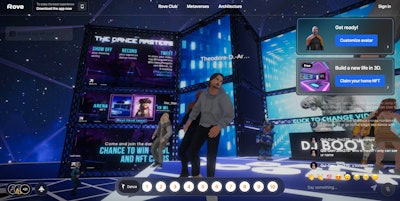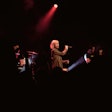
Want more content like this sent directly to your inbox? Then sign up for our brand-new BizBash Event Tech monthly newsletter to stay in the know on the latest event technology news, resources, ideas, and inspiration pushing the industry further into the era of innovation.
The first-known mention of the metaverse as we know it was in Neal Stephenson’s 1992 science fiction novel titled Snow Crash. And it wasn’t until 2021 that Facebook rebranded as Meta, and Mark Zuckerberg announced his commitment to what he referred to as “the next chapter of social connection.” (On June 9, Facebook even changed its FB stock symbol to META.)
And not even one year later—in January of this year—Rove was founded so that “anyone can start a metaverse,” said TA Nguyen, the co-founder of Rove.
“There’s no easy way to build a metaverse, taking years, complicated technology stacks, and a very large, multi-disciplined team to build, operate, maintain, and scale a fully functioning metaverse,” Nguyen explained. And these are all the things founders Mashi (a conceptualizer) and Kojiro (a cryptonomics researcher), along with TA (a software as a service, aka SaaS, expert), sought to simplify and make accessible to the general public when Rove debuted. TA Nguyen, the co-founder of Rove, said its functions are made possible with a “no-code building infrastructure, which makes it easy for any community to become a virtual nation with a thriving economy.”Photo: Courtesy of Rove
TA Nguyen, the co-founder of Rove, said its functions are made possible with a “no-code building infrastructure, which makes it easy for any community to become a virtual nation with a thriving economy.”Photo: Courtesy of Rove
 If users don't want to start from scratch, Rove offers themed spaces, including an Arena, a romantic space dubbed the Love Story (pictured), a metal-rock-inspired room called Sickomode, the DiscoDance, and the road trip-themed HighWay space.Photo: Courtesy of Rove
If users don't want to start from scratch, Rove offers themed spaces, including an Arena, a romantic space dubbed the Love Story (pictured), a metal-rock-inspired room called Sickomode, the DiscoDance, and the road trip-themed HighWay space.Photo: Courtesy of Rove
“Unlike Decentraland or Sandbox, which is a single metaverse that everyone has to join and participate in—and has to pay a lot of money to secure a plot in (land in Decentraland averages about $5,800 USD)—we envision multiple metaverses,” Nguyen described. And he noted that each of these virtual realities—which “can have their own designs, atmospheres, rules, and guidelines that fit that community’s needs”—can be made for different occasions, such as “meetings, gatherings, parties, VR concepts, and community assemblies,” just to name a few.
In efforts to encourage meeting and event planners to enter the virtual universe, Rove has debuted a brand-new offering: party spaces. Built with DJ booths and themes in mind, there’s an Arena, a romantic space dubbed the Love Story, a metal-rock-inspired room called Sickomode, the DiscoDance, and the road trip-themed HighWay space.  Aside from dance parties, Rove's meeting and event space can be used for art exhibits, music festivals, town hall meetings, community assemblies, celebrations, and more.Photo: Courtesy of Rove
Aside from dance parties, Rove's meeting and event space can be used for art exhibits, music festivals, town hall meetings, community assemblies, celebrations, and more.Photo: Courtesy of Rove
 Another in-house offering: a zero-gravity jumping area (pictured). There's also a chat function where guests can interact with one another.Photo: Courtesy of Rove
Another in-house offering: a zero-gravity jumping area (pictured). There's also a chat function where guests can interact with one another.Photo: Courtesy of Rove
And event planners, rejoice—because the party space offering is free. “We can also help customize the space with NFT projects to make it an exclusive party for communities,” Nguyen added.
In late July, NFT collection company Portalheads hosted a dance party on Rove, where more than 100 eventgoers used avatars in the brand’s unique 3D environment to showcase their best dance moves. See more from Rove's party offerings:
At the end of the day, Nguyen said Rove is all about “reinforcing our vision to empower anyone to experience 3D virtual worlds in the metaverse.”
Want to try out Rove for yourself? Access it on the AppStore, PlayStore, or your browser.



















